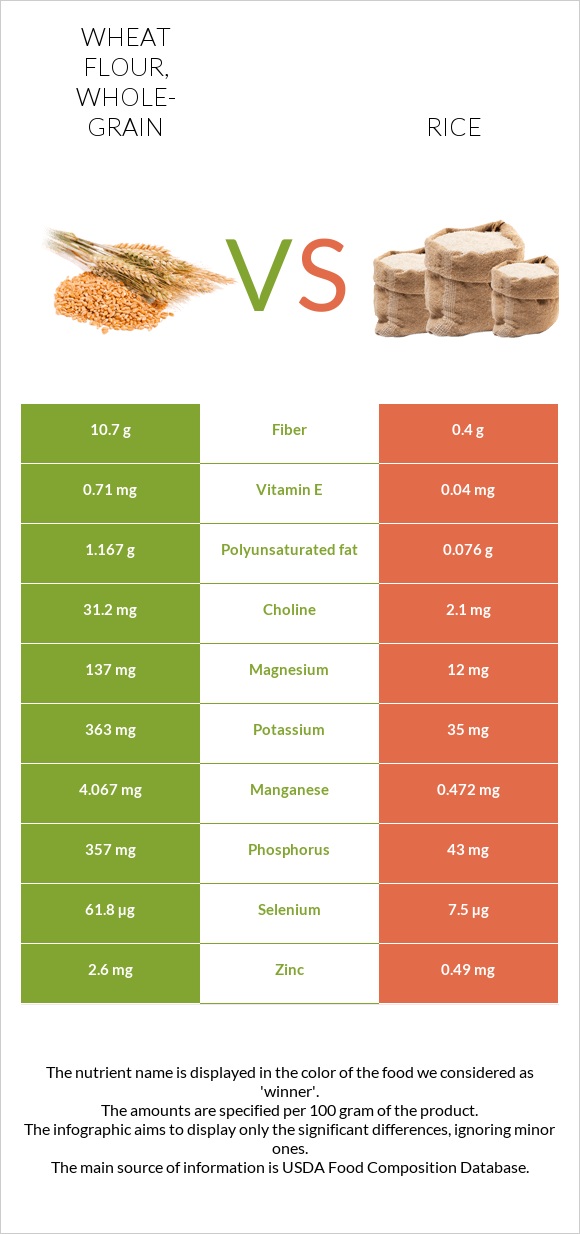Wheat flour, whole-grain vs. Rice — In-Depth Nutrition Comparison
Compare
A recap on the differences between wheat flour, whole-grain and rice
- Rice has less manganese, selenium, phosphorus, fiber, copper, iron, magnesium, vitamin B1, vitamin B6, and vitamin B3.
- Wheat flour, whole-grain covers your daily manganese needs 156% more than rice.
- Rice contains 27 times less fiber than wheat flour, whole-grain. Wheat flour, whole-grain contains 10.7g of fiber, while rice contains 0.4g.
Food varieties used in this article are Wheat flour, whole-grain and Rice, white, long-grain, regular, enriched, cooked.
Infographic

Infographic link
Mineral Comparison
Mineral comparison score is based on the number of minerals by which one or the other food is richer. The "coverage" charts below show how much of the daily needs can be covered by 300 grams of the food.
| Contains more MagnesiumMagnesium | +1041.7% |
| Contains more CalciumCalcium | +240% |
| Contains more PotassiumPotassium | +937.1% |
| Contains more IronIron | +200% |
| Contains more CopperCopper | +494.2% |
| Contains more ZincZinc | +430.6% |
| Contains more PhosphorusPhosphorus | +730.2% |
| Contains more ManganeseManganese | +761.7% |
| Contains more SeleniumSelenium | +724% |
| Contains less SodiumSodium | -50% |
Vitamin Comparison
Vitamin comparison score is based on the number of vitamins by which one or the other food is richer. The "coverage" charts below show how much of the daily needs can be covered by 300 grams of the food.
| Contains more Vitamin EVitamin E | +1675% |
| Contains more Vitamin B1Vitamin B1 | +208% |
| Contains more Vitamin B2Vitamin B2 | +1169.2% |
| Contains more Vitamin B3Vitamin B3 | +235.8% |
| Contains more Vitamin B5Vitamin B5 | +54.6% |
| Contains more Vitamin B6Vitamin B6 | +337.6% |
| Contains more Vitamin KVitamin K | +∞% |
| Contains more FolateFolate | +31.8% |
All nutrients comparison - raw data values
| Nutrient |  |
 |
DV% diff. |
| Manganese | 4.067mg | 0.472mg | 156% |
| Selenium | 61.8µg | 7.5µg | 99% |
| Phosphorus | 357mg | 43mg | 45% |
| Fiber | 10.7g | 0.4g | 41% |
| Copper | 0.41mg | 0.069mg | 38% |
| Magnesium | 137mg | 12mg | 30% |
| Iron | 3.6mg | 1.2mg | 30% |
| Vitamin B1 | 0.502mg | 0.163mg | 28% |
| Starch | 57.77g | 24% | |
| Vitamin B6 | 0.407mg | 0.093mg | 24% |
| Vitamin B3 | 4.957mg | 1.476mg | 22% |
| Protein | 13.21g | 2.69g | 21% |
| Zinc | 2.6mg | 0.49mg | 19% |
| Carbs | 71.97g | 28.17g | 15% |
| Vitamin B2 | 0.165mg | 0.013mg | 12% |
| Calories | 340kcal | 130kcal | 11% |
| Potassium | 363mg | 35mg | 10% |
| Polyunsaturated fat | 1.167g | 0.076g | 7% |
| Choline | 31.2mg | 2.1mg | 5% |
| Vitamin E | 0.71mg | 0.04mg | 4% |
| Vitamin B5 | 0.603mg | 0.39mg | 4% |
| Folate | 44µg | 58µg | 4% |
| Fats | 2.5g | 0.28g | 3% |
| Calcium | 34mg | 10mg | 2% |
| Vitamin K | 1.9µg | 0µg | 2% |
| Saturated fat | 0.43g | 0.077g | 2% |
| Net carbs | 61.27g | 27.77g | N/A |
| Sugar | 0.41g | 0.05g | N/A |
| Sodium | 2mg | 1mg | 0% |
| Monounsaturated fat | 0.283g | 0.088g | 0% |
| Tryptophan | 0.174mg | 0.031mg | 0% |
| Threonine | 0.367mg | 0.096mg | 0% |
| Isoleucine | 0.443mg | 0.116mg | 0% |
| Leucine | 0.898mg | 0.222mg | 0% |
| Lysine | 0.359mg | 0.097mg | 0% |
| Methionine | 0.228mg | 0.063mg | 0% |
| Phenylalanine | 0.682mg | 0.144mg | 0% |
| Valine | 0.564mg | 0.164mg | 0% |
| Histidine | 0.357mg | 0.063mg | 0% |
| Fructose | 0.05g | 0% |
Macronutrient Comparison
Macronutrient breakdown side-by-side comparison
Protein:
13.21 g
Fats:
2.5 g
Carbs:
71.97 g
Water:
10.74 g
Other:
1.58 g
Protein:
2.69 g
Fats:
0.28 g
Carbs:
28.17 g
Water:
68.44 g
Other:
0.42 g
| Contains more ProteinProtein | +391.1% |
| Contains more FatsFats | +792.9% |
| Contains more CarbsCarbs | +155.5% |
| Contains more OtherOther | +276.2% |
| Contains more WaterWater | +537.2% |
Fat Type Comparison
Fat type breakdown side-by-side comparison
Saturated fat:
Sat. Fat
0.43 g
Monounsaturated fat:
Mono. Fat
0.283 g
Polyunsaturated fat:
Poly. Fat
1.167 g
Saturated fat:
Sat. Fat
0.077 g
Monounsaturated fat:
Mono. Fat
0.088 g
Polyunsaturated fat:
Poly. Fat
0.076 g
| Contains more Mono. FatMonounsaturated fat | +221.6% |
| Contains more Poly. FatPolyunsaturated fat | +1435.5% |
| Contains less Sat. FatSaturated fat | -82.1% |